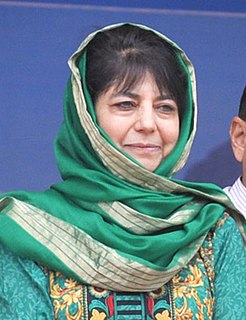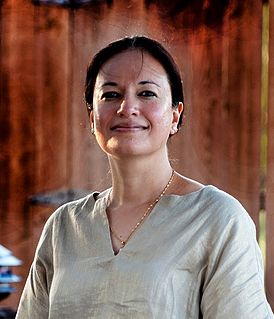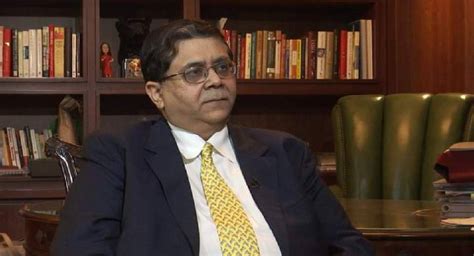A Quote by Noam Chomsky
Some kind of settlement in Kashmir is crucial for both India and Pakistan. It's also tearing India apart with horrible atrocities in the region which is controlled by Indian armed forces. This is feeding right back into society even in the domain of elementary civil rights.
Related Quotes
India had barely become independent, in 1947, when Pakistan invaded Kashmir, which at the time was ruled by a maharajah. The maharajah fled, and the people of Kashmir, led by Sheikh Abdullah, asked for Indian help. Lord [Louis] Mountbatten, who was still governor general, replied that he wouldn't be able to supply aid to Kashmir unless Pakistan declared war, and he didn't seem bothered by the fact that the Pakistanis were slaughtering the population.
The issue of Kashmir is both political and emotional in nature. Any pragmatic and lasting solution needs India and Pakistan sitting together on a table and discussing a solution that addresses the aspirations of Kashmiris and does not compromise the territorial integrity of either India or Pakistan.
A good American friend of mine who has lived in India for many years, working as a journalist, was recently denied entry to the country because he wrote on Kashmir. This is a reflection of fractures within society. Pakistan, too, has to focus on the Lashkar [Lashkar-i-Taiba] and other similar groups and work towards some sort of sensible compromise on Kashmir.
It is now that the Left in India is urging the federal government to initiate unconditional talks with all stakeholders in Kashmir. Otherwise, up until now, the Left didn't even support the autonomous status of Kashmir, and the Kashmir imbroglio is not a conflict between the forces of Marxism and capitalism.
Indira Gandhi had been this very powerful, dominating, ambiguous mother figure. Ambiguous because she was tyrannical, she had imposed...she had suspended Indian democracy for a few years but she also was the woman who had defeated Pakistan in war at a time when most male politicians in India had secretly feared fighting that war, so that here in India even today Indira Gandhi is called by Indian nationalists the only man ever to have governed India.
There are really at least two Indias, there is an India or a shining India the one which the west seas usually through urbanize and there is an India outside some of the big metro policies and in even the tier two cities and in rural India which is completely different. It goes by the name of Bahar which is a traditional name for India.
In an ideal world, you could reunite the Pakistan-occupied part of Kashmir with the Indian-occupied part and restore the old borders. You could have both India and Pakistan agreeing to guarantee those borders, demilitarise the area, and to invest in it economically. In a sane world that would happen, but we don't live in a sane world.
The animosity between India and Pakistan is deeply unfortunate and dangerous, and it's something I've long campaigned to reduce. But right now, when there's artillery being exchanged in Kashmir - which is not for from here, either - and there are 100-ish nuclear weapons on each side of the border, there's never really been a case like this where two nuclear armed countries are happily shelling each other.



































